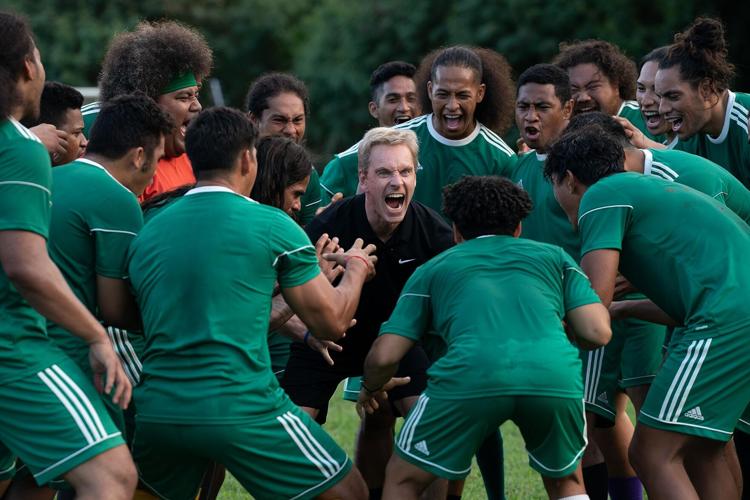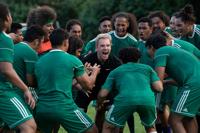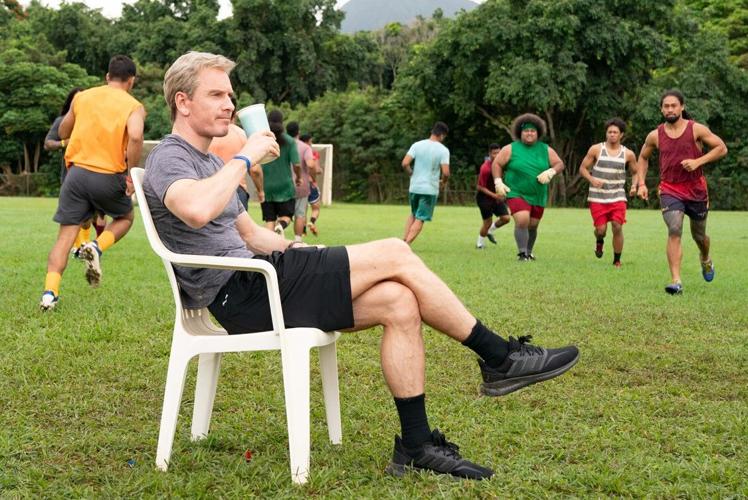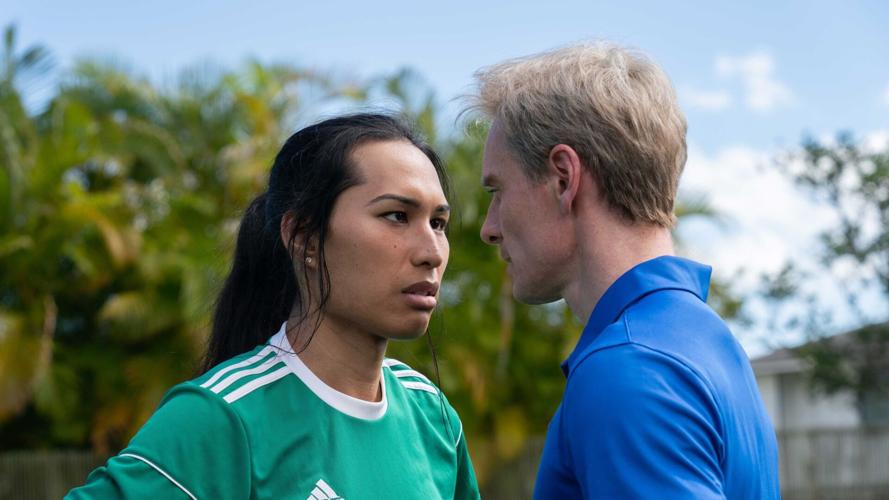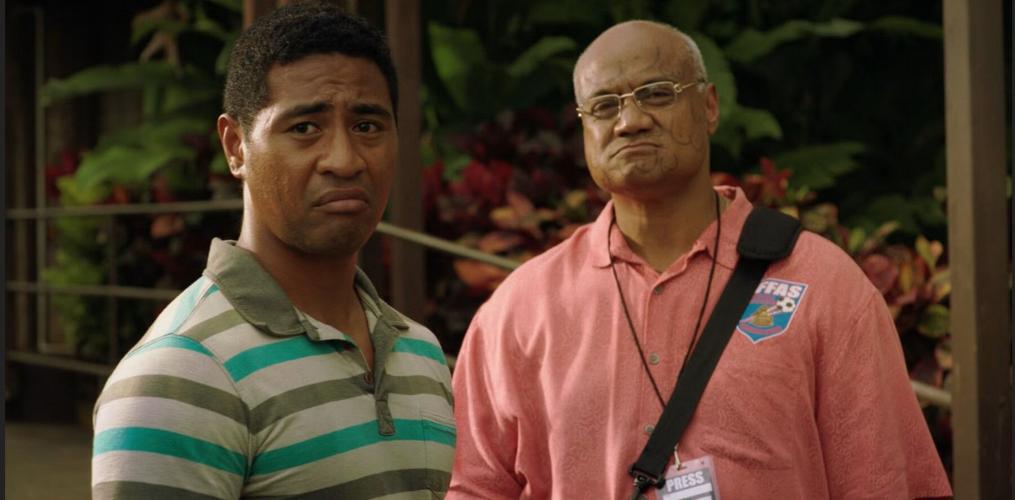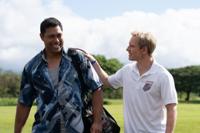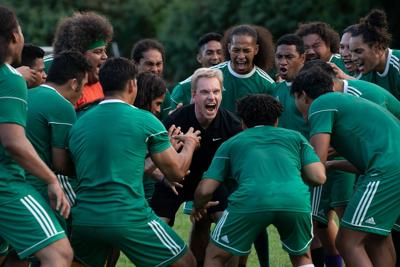Back in 2014, there was a documentary of the same name about the American Samoa football or soccer team, which was ranked at the absolute bottom of all international teams. The documentary follows the American Samoa team as it attempts to qualify for the 2014 FIFA World Cup, which results in some glass ceiling breaking. Oscar-winner, Taika Waititi (JoJo Rabbit and Thor: Ragnarok) adapts this documentary into an inspirational comedy that does what few Hollywood productions have done. It puts Polynesian people in the forefront and makes the film revolve around them and their culture. Plenty of films and TV shows have been set in Polynesian places, such as Hawaii and New Zealand, but it's rare that Polynesian people get put into starring roles. It's especially rare on the big screen. With the exception of Dwayne Johnson, most people probably couldn't name a Polynesian actor. Johnson really showed off his Samoan heritage in Moana (2016) and Fast & Furious Presents: Hobbs & Shaw (2019), but, beyond that, there's hardly any depictions or representations of Polynesians. Waititi is appreciated for giving Polynesian people the light of a mainstream film. Unfortunately, he comes up short here with how he depicts them.
So many films that are about a minority or non-White people will often suffer from what's called a "white savior" narrative. It's a trope in cinema that reinforces white supremacy and the bigoted idea that non-White people are inferior and can't hope to be better without the assistance or intervention of White people or a White person. This story is based on true-life events and in reality a White person did come and help the American Samoa team during their qualifying for the 2014 FIFA World Cup, so those facts can't necessarily be changed. However, the White person in question is the coach for the American Samoa team. He wasn't a player on the field, so how the film circumvents that white savior trope is by focusing less on the coach and instead the players. Waititi calls out the trope in his screenplay, but he doesn't circumvent it or he doesn't circumvent it as well as he could have.

Michael Fassbender (Steve Jobs and 12 Years a Slave) stars as Thomas Rongen, a Dutch-American soccer coach. He gets fired from his current coaching gig and is told that he has the choice to go and coach for the American Samoa team. He loses his job because of a recent bad record of his teams losing games or matches, as well as Thomas losing his temper on the field. He's also troubled by his recent separation or divorce from his wife and the death of his stepdaughter. As per the white savior trope, Thomas taking this coaching gig is meant to help him through theses issues of loss and anger.
In fact, Elisabeth Moss (The Handmaid's Tale and Mad Men) plays his ex-wife, Gail, and she literally has a line of dialogue where she says Thomas didn't go there to help the American Samoans, he went there to help himself. That line is meant to distance this film from the white savior trope, but there's still an undercurrent here that the team couldn't have hoped to win or score at least one goal without Thomas' help or mere presence. One could argue that it's not Thomas, but the players on the field that are the ones winning or scoring the points. That's fine, but, in order for that to be effective, the film really should delve into the players as much as it can. Yet, it doesn't. We barely learn the names of many of the other players or spend any time at home with them to get further insight into who they are.

Kaimana co-stars as Jaiyah Saelua, the first openly transgender woman to compete in a FIFA World Cup qualifier. When it comes to not delving into the players, she's the one exception, but, even she doesn't get as much time as she should have. She bumps heads with Thomas because of his transphobia. He doesn't think she should play on the team because she identifies as a woman. He doesn't understand that transgender or what's called "third gender" is totally acceptable in Samoan culture. We also learn about her transition. We see where she works. We get one brief shot of her at home, but we don't get any more of her home life or social life, beyond her interactions with Thomas. This is true of many of the other players on the team.
Oscar Kightley also co-stars as Tavita, the head of the Football Federation American Samoa or FFAS. We see him here and there. He works as a cameraman for a local television program. He also runs a restaurant. Apparently, his son is a member of the national team. That team had one of the worst losses in qualifying history. In 2001, the American Samoa team lost 31-0. Since then, the team has not won a single game nor even scored a single point. Tavita doesn't seem to take any responsibility for this. He simply keeps deferring to his coach, Ace, played by David Fane (Our Flag Means Death), who comes across as an idiot and an extremely passive guy, not willing to push anything.

Beulah Koale (Hawaii Five-0 and Thank You For Your Service) plays Daru, the son to Tavita and a member of the soccer team. He also works at his father's restaurant. We get a couple of scenes of Daru at home with his mom, Ruth, played by Rachel House who has appeared in several of Waititi's films. We also see Daru at work with his father. Yet, most of Daru's scenes with his mom and dad feel perfunctory. Yes, the tone is a silly comedy, but there's nothing between Daru and his family that makes me feel their relationship. The film never provides much to give us insight into Daru's mind, beyond his interactions with Thomas.
There's another scene involving a team member named Smiley, played by Ioane Goodhue. Smiley starts to speak and provide some insight into himself and give himself some more depth than the superficial treatment he got the whole film, but Thomas interrupts him and literally shuts Smiley up. This felt endemic for how the whole film operates. Instead of letting the film delve deeper into these American Samoans, it shuts them up in favor of a cheap joke. The film gives characters played by Will Arnett more screen time that could have gone to actors like Koale or Goodhue.

Uli Latukefu (Young Rock and Marco Polo) plays Nicky Salapu, another character who gets extreme short shrift here. Nicky is the goalkeeper during the 31-0 loss, which is the opening scene of this film. That loss has caused a lot of psychical effect to the players and whole country in the decade that followed. Yet, the film probably only gives Nicky a couple lines of dialogue total. He becomes an important and integral part of the team and its qualifying game. Yet, the film doesn't allow him to speak hardly at all. Instead, we get numerous scenes of Thomas' culture clash with the American Samoan people or bits of comedy like Waititi himself as a priest. These comedy bits fall flat and didn't add much.
Rated PG-13 for some language and crude material.
Running Time: 1 hr. and 43 mins.
In theaters.

